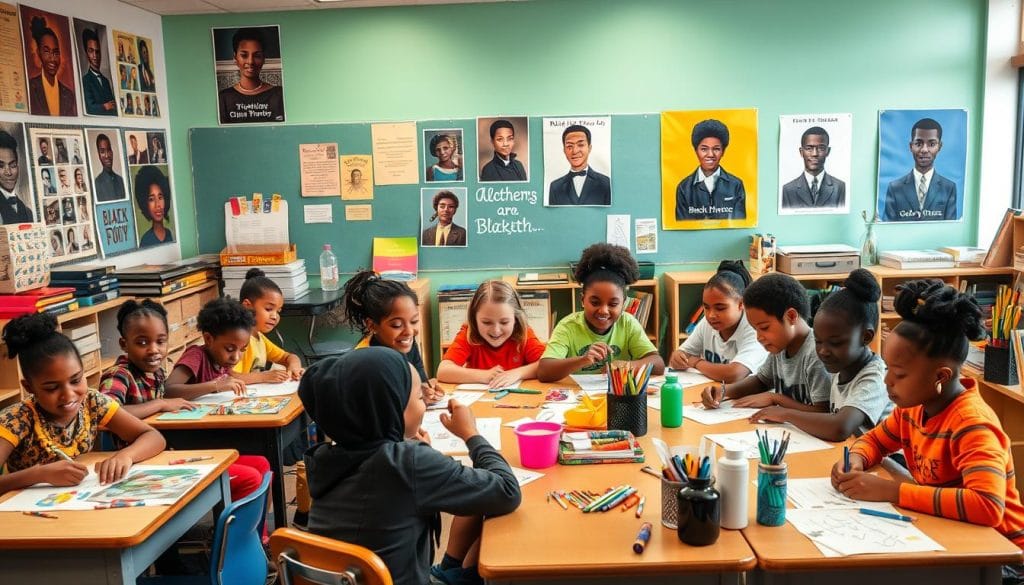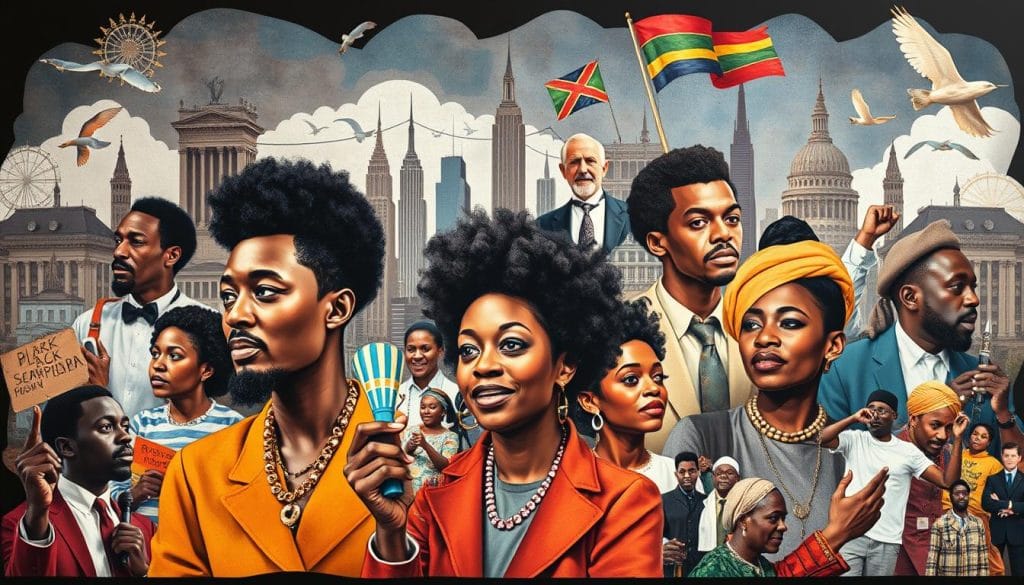Many students leave high school without knowing much about Black History Education. This is a key part of learning about African American History. Not knowing about this can change how they see the world and their role in it.
Learning about Black History is vital for a fair and diverse society. We must make sure schools teach it well.
By understanding Black History Education, we see its value today. It helps us learn about the world in a deeper way. This knowledge is key for schools to teach.
This knowledge helps us understand complex issues better. It makes us more aware and informed.
Key Takeaways
- Black History Education is essential for fostering a more inclusive and equitable society.
- The African American History Curriculum is a crucial component of a well-rounded education.
- Many students graduate from high school without a comprehensive understanding of Black History Education.
- Incorporating Black History Education into our schools can help to promote a more nuanced and informed understanding of complex issues.
- Black History Education has a profound impact on students’ perception of the world and their place in it.
- Prioritizing Black History Education can help to create a more informed and empathetic citizenry.
The Importance of Black History Education
Learning about Black history is key to understanding social justice. It helps us see how Black people have shaped history. This knowledge comes from Civil Rights Movement Lessons, showing us the highs and lows of the movement.
Diversity Education Resources are also vital. They help us see how Black history fits into today’s world. By using these resources in school, students get a fuller picture of our history.
- Understanding the historical context of racial identity and its impact on personal identity
- Learning about the experiences and contributions of Black people throughout history
- Developing a deeper appreciation for the complexities of social justice issues
By focusing on Black history in schools, we can build a fairer society. We can do this by giving students Diversity Education Resources and Civil Rights Movement Lessons. This helps them understand our world’s history better.
Common Misconceptions in Education
Black History Month Activities often focus on a few famous figures and events. This can lead to a lack of understanding and appreciation for the rich Cultural Heritage Learning. It can also perpetuate common misconceptions in education, like overlooking key figures and simplifying event narratives.
The Overshadowing of Key Figures
Important historical figures are often overshadowed by more famous ones. For example, Mary Seacole and Madam C.J. Walker were trailblazers in their fields. Yet, their stories are often lost in the shadow of more well-known figures.
Simplified Narratives of Events
Complex historical events are often simplified, distorting their true nature. By adding more detailed and accurate accounts of Black History to Cultural Heritage Learning, we can tackle these misconceptions. This helps promote a deeper understanding and appreciation of the subject.

The Role of African American History in the Curriculum
African American History is crucial in the curriculum. It helps students understand the country’s past and its current impact. By teaching Racial Equality Education, students learn about African Americans’ struggles and successes. This promotes Social Justice Teachings and helps create a fairer society.
Standardized Education vs. Comprehensive Learning
Standardized education often misses the mark on Black History. But, comprehensive learning offers a deeper, more accurate view. It includes:
- Encouraging critical thinking and analysis
- Providing a diverse range of perspectives and voices
- Fostering empathy and understanding
With comprehensive learning, educators can teach students about African American History in a meaningful way. This enriches the curriculum and helps students see its importance.
The Contributions of Black Innovators and Leaders
Black innovators and leaders have greatly impacted science, technology, arts, and culture. Their work has changed how we see the world and our role in it. Through Black History Education, we learn about their achievements and how they’ve influenced society. Educational Resources on Black History offer a wealth of information, showing why diverse perspectives are crucial in education.
Some notable examples of Black innovators and leaders include:
- Madam C.J. Walker, a pioneering entrepreneur who built a business empire in the early 20th century
- George Washington Carver, a renowned scientist who developed innovative uses for crops such as peanuts and sweet potatoes
- Langston Hughes, a celebrated poet and writer who played a key role in the Harlem Renaissance
These individuals, along with many others, have opened doors for future generations. By exploring their contributions, we understand the value of 
| Name | Field | Contribution |
|---|---|---|
| Madam C.J. Walker | Entrepreneurship | Built a business empire in the early 20th century |
| George Washington Carver | Science | Developed innovative uses for crops such as peanuts and sweet potatoes |
| Langston Hughes | Arts and Culture | Played a key role in the Harlem Renaissance |
Unsung Heroes of Science and Technology
Many unsung heroes in science and technology have made big impacts. They’ve faced many challenges but never gave up. Their stories teach us about the power of perseverance and determination.
Pioneers in Arts and Culture
Black pioneers in arts and culture have greatly influenced our understanding of the world. They’ve used their talents to share their stories and express themselves. Their work shows the importance of arts and culture in shaping our identities and views of the world.
Exploring the Civil Rights Movement
The Civil Rights Movement was a key moment in American history. It changed the country’s social justice scene. To get its importance, we must look at major events and the lessons from grassroots efforts. These insights help us see why diversity and inclusion are key in education.
Important events like the Montgomery Bus Boycott and the March on Washington shaped the movement. These moments showed the struggles faced by African Americans. They also showed the strength of working together and organizing as a community. The lessons from these times are still important today, teaching us about the need for ongoing education and awareness.
Grassroots efforts were crucial to the movement’s success. Leaders like Martin Luther King Jr. and Rosa Parks inspired many to act. Their work shows the power of community and the need for education that promotes understanding and inclusivity. By learning from history, we can strive for a fairer society where everyone has equal chances.
Key takeaways from the Civil Rights Movement include:
- The importance of collective action and community organizing
- The need for continued education and awareness about social justice issues
- The value of diversity and inclusion in creating a more equitable society
By using these lessons and Diversity Education Resources, we can keep moving towards a fairer and more inclusive society for everyone.
The Influence of Black Literature
Black literature has shaped our view of the Black experience. Authors have shared the struggles and triumphs of the Black community through their works. Cultural Heritage Learning is key to understanding these stories.
During Black History Month Activities, we must highlight Black literature’s role in education. Adding works by Black authors to school curricula is important. Authors like Langston Hughes, Zora Neale Hurston, and Maya Angelou have greatly influenced literature.
Storytelling is powerful in education. Black authors have used their stories to promote empathy and understanding. This is especially true during Black History Month Activities, where we celebrate Black culture and heritage.
Some important works for Cultural Heritage Learning include:
- “The Souls of Black Folk” by W.E.B. Du Bois
- “Their Eyes Were Watching God” by Zora Neale Hurston
- “I Know Why the Caged Bird Sings” by Maya Angelou
These books offer deep insights into the Black experience. They help readers understand the historical and social context of Black literature.
The Intersectionality of Race and Other Issues
Racial Equality Education is key to understanding how race intersects with other issues. Black people’s experiences are shaped by gender, class, and sexual orientation. Social Justice Teachings highlight the need to consider these intersections for a fair society.
Gender, Class, and Sexual Orientation
These factors have greatly affected Black people’s lives. They impact education, jobs, and healthcare access. For instance, Black women face racism and sexism, leading to unique challenges.
Historical Perspectives on Intersectionality
Knowing the history of intersectionality is vital for Social Justice. The Civil Rights Movement aimed for racial, economic, and social justice. Racial Equality Education helps us see these complexities and strive for a just society.
By adding Racial Equality Education and Social Justice Teachings to our curriculum, we can create a fairer place. This can be done by:
- Supporting marginalized communities
- Encouraging diversity in education and jobs
- Building a culture of empathy and understanding
Addressing the intersectionality of race and other issues needs a broad approach. It must consider the complexities of Social Justice Teachings and Racial Equality Education.
Black History Beyond the Classroom
Black History Education goes beyond school walls. It’s important to see the role of community and cultural events. These help us understand and value Black History more deeply. By using Educational Resources on Black History, we can learn more.
Community Involvement and Outreach
Getting involved in the community is key to learning about Black History. Ways to do this include:
- Attending local cultural events and festivals
- Helping out at historical societies and museums
- Working with groups that support Black History Education
This helps build a sense of community and understanding of Black History.
Cultural Celebrations and Events
Cultural events are crucial for learning about Black History. They offer chances to explore different parts of Black culture. Some important events are:
- Black History Month celebrations
- Martin Luther King Jr. Day events
- Juneteenth commemorations
By joining in these events, we can better understand Black History’s importance. Educational Resources on Black History offer valuable insights to enhance these experiences.
The Role of Technology in Black History Education
Technology is key in teaching Black History. It gives students access to many online resources and learning platforms. These tools help students learn about African American history and culture through Cultural Heritage Learning and Black History Month Activities.
Digital archives are important for keeping historical documents safe. They let students see primary sources up close. This helps them understand historical events better.
Online Resources and Learning Platforms
Online resources and learning platforms have many tools for teaching Black History. They offer interactive lessons, quizzes, and games. This makes learning fun and engaging. Popular sites include online museums, historical societies, and educational websites.
Digital Archives and Their Importance
Digital archives are vital for keeping historical documents safe. They make it easy for students and researchers to find historical information. They also help create interactive exhibits for Black History Month Activities and Cultural Heritage Learning.
Implementing Effective Black History Programs
To make learning more inclusive, teachers need to focus on Racial Equality Education and Social Justice Teachings. They should create lessons that highlight the varied experiences and achievements of Black people. This helps students grasp the depth of Black History and its effects today.
Some key steps for teachers include:
- Adding diverse viewpoints to the curriculum
- Encouraging deep thinking and open talks
- Offering ways for students to explore Black History through books, art, and music
Creating an inclusive curriculum takes careful thought and effort. Teachers must be open to hearing from students and the community. This way, they can foster a space that honors diversity, leading to a fairer and more just world through Racial Equality Education and Social Justice Teachings.
The success of Black History programs depends on everyone working together. By joining forces, we can build a learning space that values and celebrates diversity. This promotes Social Justice Teachings and honors the rich heritage of Black History.
| Best Practices | Benefits |
|---|---|
| Integrate diverse perspectives | Promotes critical thinking and empathy |
| Encourage open discussion | Fosters a sense of community and inclusivity |
| Provide opportunities for engagement | Enhances student understanding and appreciation of Black History |
Advocacy for Better Black History Education
Advocacy is key in pushing for Black History Education and a fairer society. By working with parents and leaders, we can highlight the value of Educational Resources on Black History. This helps students understand different cultures and experiences.
Engaging Parents and Community Leaders
Parents and community leaders are strong voices for Black History Education. They can attend school meetings, join groups, and back initiatives for Educational Resources on Black History. Here are some ways to get them involved:
- Organizing workshops and training sessions on Black History Education
- Creating community events to celebrate Black history and culture
- Developing partnerships with local organizations to provide Educational Resources on Black History
Legislative Efforts and Support
Legislative actions are also vital for better Black History Education. Supporting laws that focus on Educational Resources on Black History ensures all students get a full education. Here are some legislative efforts:
| Legislative Effort | Description |
|---|---|
| Black History Education Act | A bill that requires schools to include Black History Education in their curriculum |
| Cultural Competence Training | A program that provides teachers with training on Educational Resources on Black History and cultural competence |
The Future of Black History Education
The future of Black history education is set to change in big ways. Teachers and leaders are working to make curriculums more complete and diverse. They want to show the wide range of experiences and achievements of African Americans.
Trends in Curricular Innovations
Digital tools and interactive learning are becoming more common. These help students dive into Black history in new ways. From virtual tours to multimedia, technology makes learning fun and engaging.
Preparing for Diverse Future Generations
The U.S. is getting more diverse, making inclusive education key. It’s vital to teach about the Civil Rights Movement and diverse views. This way, students can understand and deal with a multicultural world.
By teaching Black history, we prepare students to lead and make a difference. They’ll be ready to face the future’s challenges.
